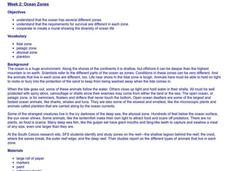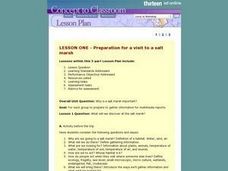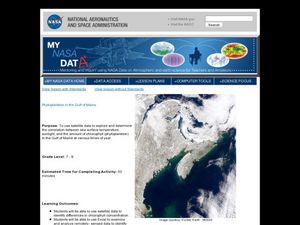Curated OER
Helpful Animals and Compassionate Humans in Folklore
Students define elements of stories from around the world that include helpful animals. They explore animal character motivations and use graphic organizers to compare and contrast animal stories from different cultures.
Curated OER
Animals
What kinds of animals live in Spanish-speaking countries? Do they live in the zoo, the garden, or the sea? Discuss animals with your young, experienced Spanish speakers. Then use photos to practice describing where certain animals live....
Curated OER
Plankton in the Air
Here is a lab activity adequate for use with any full lesson on environmental factors that shape animal adaptations or marine animal characteristics. Pupils will discuss the role plankton plays in the environment and filter-feeding...
World Wildlife Fund
Land of the Midnight Sun
From days of 24 hour sunlight, to endless nights that last for days, the Arctic is a very unique place to live. Examine the seasonal changes that occur in the northern-most reaches of the globe and the impact they have on the plants and...
Curated OER
Compare and Contrast Graphic Organizer
In this graphic organizer, students compare and contrast land animals and sea animals. They make a list of how they are different, and another list of how they are different after looking at photographs on the page.
Rainforest Alliance
How Do Jaguars and Howler Monkeys in Belize Depend on Us?
How does weather play a role in the lives of land and sea creatures? Find out with a lesson focused on habitats and the ways animals from different homes are connected. Here, learners explore how the life of a jaguar and howler...
Curated OER
Classification and Adaptations- Streams, Rivers, and Lakes - Where the Land Meets the Sea And Caribbean Reef
In this science worksheet set, learners answer 14 short answer questions about the classification and adaptation of life in streams, rivers, and lakes. They also answer 15 questions about life "Where the Land Meets the Sea" and in a...
Curated OER
Land or Sea
In this habitats worksheet, students cut pictures of animals and paste them to match their land or sea habitats. Students cut and paste six animals.
American Museum of Natural History
Make Your Own Creatures of Light
Bioluminescent animals are the focus of a hands-on craft in which scholars create a scene of either a land or sea bioluminescent creature.
Curated OER
Compound Species
Students gather pictures of animals, fish, birds, and insects, and sort them by category: land, sea, and air creatures. They choose two of these categories and imaginatively combine part of animals (such as horns, tentacles, fins, floppy...
Curated OER
Loggerhead Turtle Fun Facts
Young scholars study loggerhead turtles and learn facts about reptiles. In this turtles lesson, students read information about loggerhead turtles and study their various sections and characteristics. Young scholars then make their own...
Curated OER
Ocean Zones
Students create a mural showing ocean zones and the diversity of ocean life. They use reference books to create a list of plants and animals that would live in each zone.
Curated OER
The Earth's Ecosystems
In this ecosystem worksheet, students complete 6 short answer questions and complete 10 word puzzles about marine and land ecosystems.
Curated OER
Why is a salt marsh important?
Learners discuss the salt marsh. They define the following terms: habitat, water, land and air. Students work in small groups. They are asked why are they going to a salt marsh? Learners discuss whose habitat is it at the salt marsh.
Curated OER
What is an Ahupua'a?
Students research ahupua'a ecosystems. In this ahupua'a lesson, students explore how land is subdivided in Hawaii and the effect on the ecosystem. Resources are provided.
Curated OER
What Lives In A Shell?
Younger students focus on animals and animal habitats in the lower grades. This resource defining habitats focuses on sea animals with shells, but could be augmented to be a richer experience.
Curated OER
Science Jeopardy - The Earth Sciences
The earth sciences are the focus for this Jeopardy-style review game. Categories include geology, space, scientific investigation, meteorology, and oceanography. Diagrams and pictures are involved with most of the questions, making this...
Curated OER
Phytoplankton in the Gulf of Maine
Students use satellite data to see the correlation between sea temperature and sunlight in the Gulf of Maine. For this phytoplankton lesson students use Excel to analyze data.
Curated OER
Wildlife
First, biology pupils research land and marine habitats along the route of skipper Rich Wilson's Great American II. Then, using colored paper clips scattered across a colored paper background, they play the predator-prey game to...
Curated OER
Wheel of Trouble
While teaching about endangered species, you can incorporate this activity as a take-home reminder of what is threatening the sea turtle population. It is one of those paper plate projects in which a wedge is cut out to reveal a picture...
American Museum of Natural History
What's This? Breathing
Crazy fact: Some animals can survive months without oxygen. An online resource describes some unique ways animals collect oxygen and even live without it for an extended time. Learners read about these special animals and use pop-up...
Polar Bears International
Top of the World
Learn about polar bears and the Arctic circle with a lesson about the countries and conditions of the region. After examining how the area differs from Antarctica, kids explore climates, animals, and geographical position...
American Museum of Natural History
What do You Know About Marine Biology
Show me what you know about the sea. Learners answer 10 questions about marine biology. The questions range from what evidence points to the origin of life to the biggest threat to oceans.
Curated OER
Latitude/Longitude Activity
Youngsters work in groups to solve clues involving latitude and longitude coordinates in order to decipher mystery animals in this fun learning experience!

























